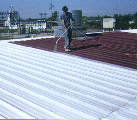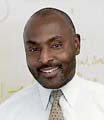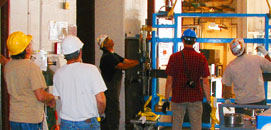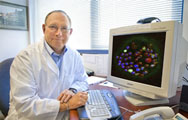


[New York Times] Relying on the centuries-old principle that white objects absorb less heat than dark ones, homeowners are in the vanguard of a movement embracing “cool roofs” as one of the most affordable weapons against climate change. Around the country, roof makers are racing to develop products in the hope of profiting as the movement spreads from the flat roofs of the country’s malls to the sloped roofs of its suburbs. Years of detailed work by scientists at Berkeley Lab have provided the roof makers with a rainbow of colors — the equivalent of a table of the elements — showing the amount of light that each hue reflects and the amount of heat it re-emits. More>
 Funding Opportunity: Presentation on Early Career Research Program Now Online
Funding Opportunity: Presentation on Early Career Research Program Now OnlineAn overview of the Early Career Research Program presented by Interim Lab Director Paul Alivisatos on Tuesday is now available online. The program is funded by the Department of Energy as part of the American Recovery and Reinvestment Act. Eligible researchers must be full-time, career or career track, and at least 10 years from their PhD. Go here for more information on the program, including funding, deadlines, and information resources. Send questions about the Lab’s submission process here.
 Services for Harry Reed, the retired head of the Lab’s Office of Workforce Diversity who died on July 21, are scheduled for this weekend. The viewing will take place on Sunday from noon to 6 p.m. at Wiggins Funeral Home (524 Capitol St.) and the funeral on Monday at 11 a.m. at the Good Samaritan Baptist Church (407 Capitol St.). Both locations are in Vallejo. Donations in Reed’s honor can be made to the Ala Costa Center, an after-school learning program for students with developmental disabilities. Go here to read the obituary on Reed that ran in Today at Berkeley Lab.
Services for Harry Reed, the retired head of the Lab’s Office of Workforce Diversity who died on July 21, are scheduled for this weekend. The viewing will take place on Sunday from noon to 6 p.m. at Wiggins Funeral Home (524 Capitol St.) and the funeral on Monday at 11 a.m. at the Good Samaritan Baptist Church (407 Capitol St.). Both locations are in Vallejo. Donations in Reed’s honor can be made to the Ala Costa Center, an after-school learning program for students with developmental disabilities. Go here to read the obituary on Reed that ran in Today at Berkeley Lab.
 The 88-Inch Cyclotron has just completed a complex vacuum repair on the cover plate of its accelerating Dee structure. This was a historic event since the last time this structure was removed was over 30 years ago. The 2,400-pound massive copper structure is suspended 14 feet into the Cyclotron’s main tank, and moving it safely is an engineering challenge. More>
The 88-Inch Cyclotron has just completed a complex vacuum repair on the cover plate of its accelerating Dee structure. This was a historic event since the last time this structure was removed was over 30 years ago. The 2,400-pound massive copper structure is suspended 14 feet into the Cyclotron’s main tank, and moving it safely is an engineering challenge. More>
 Summer Lecture: Gray Discusses Personalized Cancer Treatment
Summer Lecture: Gray Discusses Personalized Cancer TreatmentResults from the Human Genome Project are enabling scientists to understand how individual cancers form and progress. This information, when combined with newly developed drugs, can optimize the treatment of individual cancers. Joe Gray, director of Berkeley Lab’s Life Sciences Division and Associate Laboratory Director for Life and Environmental Sciences, will focus on this approach, its promise, and its current roadblocks — particularly with regard to breast cancer. The event takes place Tuesday at noon in the Building 66 Auditorium. Summer Lectures are geared towards lay audiences, so all Lab staff can enjoy them.
Employees may engage in outside business activities outside Laboratory hours and away from the Laboratory as long as such activities do not interfere with performance of their Laboratory duties, create a real or apparent conflict of interest or subject DOE or the Laboratory to public criticism or embarrassment. More>
Today at Berkeley Lab is produced by Public Affairs' Communications Department